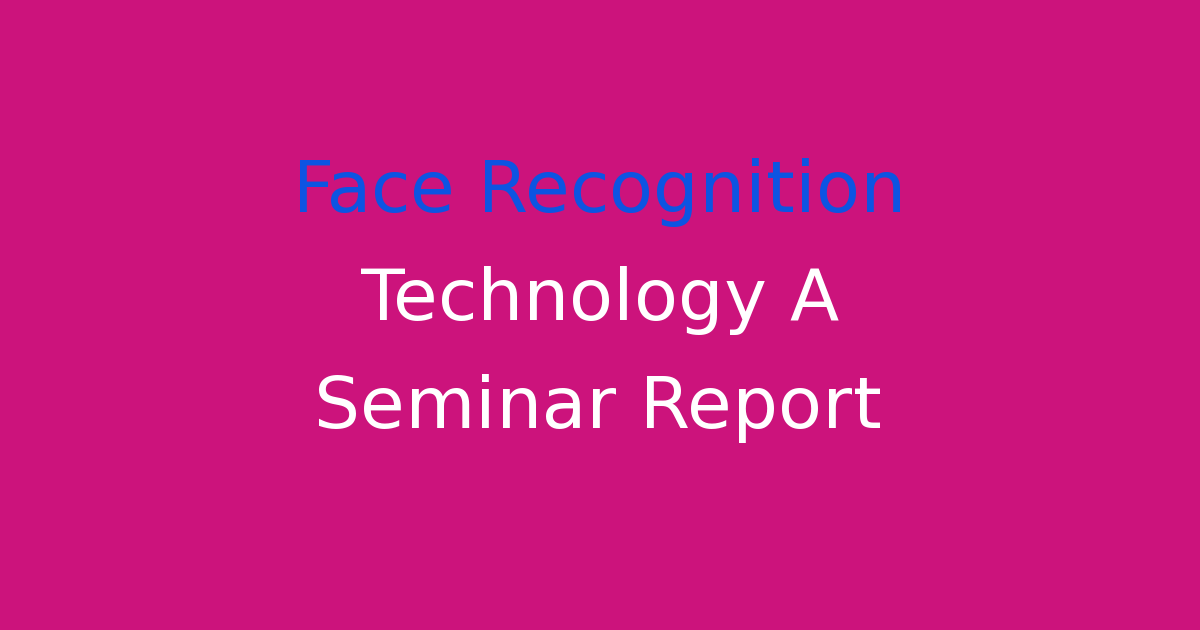Seminar report on the advancements in facial recognition technology.
Face Recognition Technology: A Seminar Report
Introduction
Face recognition technology is a rapidly growing field in the field of biometric technology. It has the potential to revolutionize security systems, access control, and many other aspects of our daily lives. The ability of computers to identify and verify individuals based on their unique facial features is incredibly powerful and has a myriad of applications. In this seminar report, we will explore the current state of face recognition technology, its limitations, and propose a new system that seeks to address some of these issues.
Problem Statement
While face recognition technology has made significant advances in recent years, there are still some significant challenges that need to be addressed. Current systems often struggle with accuracy, especially in varying lighting conditions, angles, and facial expressions. Additionally, there are concerns about privacy and data security when using facial recognition technology. These limitations hinder the widespread adoption of face recognition technology in various industries and applications.
Existing System
The existing face recognition systems typically use a database of facial images to match and identify individuals. These systems use various algorithms to analyze the unique features of a person’s face, such as the distance between the eyes, nose, and mouth. While these systems have improved significantly over the years, they still face challenges in accuracy and speed. Moreover, they are susceptible to errors in identifying individuals under challenging conditions.
Disadvantages
One of the main disadvantages of existing face recognition systems is their susceptibility to errors. These systems can often misidentify individuals, especially in cases where there are changes in lighting, facial expressions, or angles. This can lead to security breaches and false positives, which can have serious consequences. Additionally, there are concerns about privacy and data security when using facial recognition technology, as the use of biometric data raises ethical and legal issues.
Proposed System
In response to the limitations of existing face recognition systems, we propose a new system that utilizes advanced deep learning algorithms for more accurate and reliable face recognition. This system will use convolutional neural networks (CNNs) to analyze and identify unique facial features, taking into account variations in lighting, angles, and expressions. By leveraging the power of deep learning, we aim to improve the accuracy and speed of face recognition technology.
Advantages
The proposed face recognition system offers several advantages over existing systems. Firstly, the use of deep learning algorithms increases the accuracy and reliability of facial recognition, reducing the chances of misidentification and false positives. Additionally, the system can adapt to changes in lighting, angles, and facial expressions, making it more robust in challenging conditions. Furthermore, by using advanced encryption techniques, we can enhance the privacy and security of biometric data, addressing concerns about data breaches and misuse.
Features
Some key features of the proposed face recognition system include:
– Utilization of convolutional neural networks for analyzing facial features
– Adaptability to changes in lighting, angles, and facial expressions
– Enhanced accuracy and reliability in face recognition
– Advanced encryption techniques for protecting biometric data
– Improved speed and efficiency in identifying individuals
– User-friendly interface for seamless integration into existing systems
Conclusion
In conclusion, face recognition technology has the potential to transform various industries and applications, from security systems to access control. While existing systems have made significant advancements, there are still limitations that need to be addressed. The proposed system, which utilizes deep learning algorithms for more accurate and reliable face recognition, seeks to overcome these challenges and enhance the capabilities of facial recognition technology. By improving accuracy, adaptability, privacy, and security, we aim to pave the way for a more efficient and secure future for face recognition technology.

